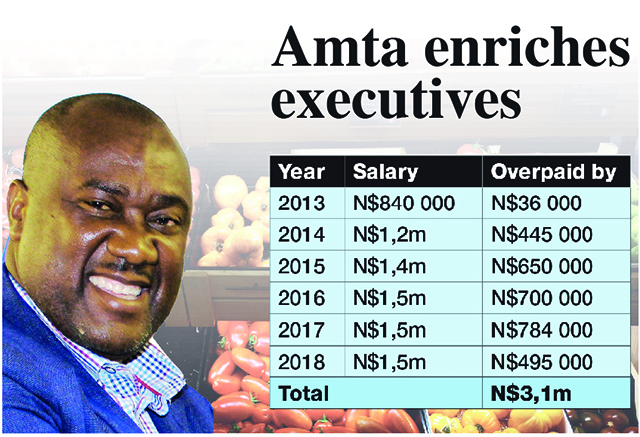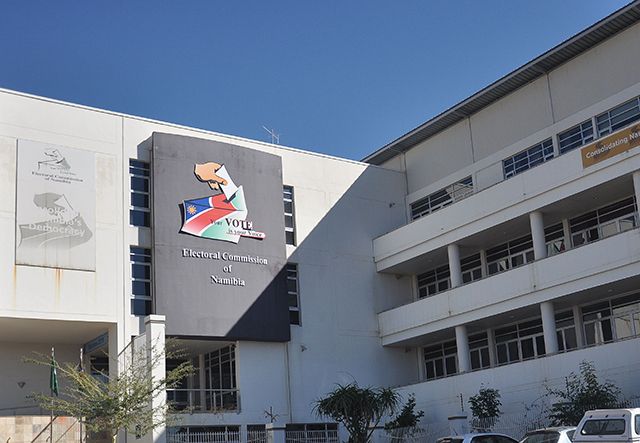THE managing director of the financially struggling state-owned Agro-Marketing and Trade Agency, Lucas Lungameni, has been overpaid by N$3,1 million from 2014 to 2018.
Five senior managers of the Agro-Marketing and Trade Agency (Amta) have also been overpaid by N$1,5 million each since 2015.
This is contained in documents reviewed by , which also show that Amta’s board decided not to renew Lungameni’s contract after he oversaw an agency hit by alleged corruption, illegal deals and overpaid executives.
According to documents, Lungameni and his senior managers were paid above public enterprises’ stipulations since 2014, when the parastatal was formed.
Questions sent to Lungameni last week were not answered, despite a reminder earlier this week. He did not respond to questions on whether he will pay back the taxpayers’ money he was overpaid.
The government formed Amta to facilitate the marketing and trading of agricultural produce, and to promote food security in Namibia.
The parastatal operated fresh produce hubs in Windhoek, at Ongwediva and Rundu, but the entity turned out to be a cash cow for a few business people and executives.
Lungameni, documents show, was paid N$840 000 a year when he took charge at Amta in 2014. That salary was already above the government stipulation that a chief executive heading a parastatal of the level of Amta should earn N$803 000 a year.
Lungameni’s salary increased to N$1,2 million in 2014, which resulted in him being paid N$445 000 a year above the Ministry of Public Enterprises’ remuneration guidelines.
The Amta boss was paid N$1,4 million the following year, which resulted in him being overpaid by N$650 000 that year.
His salary increases continued in 2016 when he was paid N$1,5 million, increasing his overpayment to N$700 000 that year.
The Amta boss was again paid N$1,5 million in 2017 and 2018.
In total, Lungameni was overpaid by N$3 million between 2013 and 2018.
Amta has been relying on bailouts from the government since it started operating. The parastatal received around N$30 million from the national budget in the last two years.
Like Lungameni, Amta managers were also paid handsomely.
Amta started with four executives, who each earned N$564 000 in 2014, but they now all earn N$988 000 a year.
The first Amta managers were Seth Awa-Eiseb (human resources), Reagen Kooper (finance), Alfeus Siyamba (fresh produce business hubs) and Wilhemina Handunge (national strategic food reserves).
Awa-Eiseb’s salary increased by N$222 000 to N$786 000 from 2013 to 2014.
Kooper also earned big money at the financially struggling Amta. His pay increased from N$564 000 in the 2013/14 budget year to N$988 000 last year.
Since 2015/16, Amta’s senior executives below the managing director have been overpaid by N$1,5 million each. Public enterprises’ pay guidelines state that executives at that level should have received N$722 422 in 2018/19.
Agriculture minister Alpheus !Naruseb, the political head of Amta, told The Namibian this week that the executives who overpaid themselves would have to explain.
!Naruseb told The Namibian yesterday that there are processes which need to be followed to hold anyone accountable.
“I did not give any permission for them to overpay themselves,” the minister stressed.
!Naruseb wrote to public enterprises minister Leon Jooste last year on the salaries of Amta executives.
Responding to !Naruseb in a letter dated 18 December 2018, Jooste said: “For the past five years, the annual salary increases implemented by Amta were above the inflation rate, which have resulted in an average of a 27% variance above the 90th percentile of the gazetted remuneration directive.”
Jooste said his office did not have records of any exemption granted for Amta “to pay the chief executive and senior management above the gazetted remuneration directive”.
The minister said although the 2017 audited financial statements indicate that there has been an increase in income and a cash surplus for Amta, it was mainly attributed to government grants.
“The total salary bill [of Amta] is 61% of the total expenditure, and it is not sustainable, taking into consideration the government grant risk factor,” Jooste explained.
The current workforce could not be confirmed, but Namibian Sun reported in 2017 that Amta’s staff increased from 126 to 168 workers, which resulted in the wage bill increasing by N$30 million, from N$33 million to N$63 million.
Stay informed with The Namibian – your source for credible journalism. Get in-depth reporting and opinions for
only N$85 a month. Invest in journalism, invest in democracy –
Subscribe Now!






